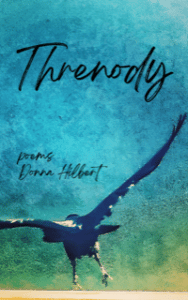Donna Hilbert finds love in the poetry of lament
Poet Donna Hilbert has something to say about the idea of lament. And like the fine poet she is, she says it in poetry.
A lament is a poetic form inspired by deep, personal grief. According to the Encyclopedia Britannica, the poetry of lament is as old as poetry itself, developing alongside the oral tradition of heroic poetry. And it’s found in most languages.
Examples of lament poetry have been found in ancient Sumeria, in Homer, in Roman literature, and in Anglo-Saxon England. Geoffrey Chaucer’s “The Man of Laws Tale” in The Canterbury Tales is a lament, as is John Milton’s “Samson Agonistes.” Wordsworth, Keats, and Shelley wrote lament poems, as did Sir Walter Scott and Thomas Hardy (The Darkling Thrush). With In Memoriam, Tennyson may have written a lament epic. Dylan Thomas and Pablo Neruda wrote poems of lament.
In Threnody: Poems, her new collection of 62 poems, Hilbert continues that tradition of lament, demonstrating that the modern lament is as contemporary as its older and ancient predecessors. That is likely because its inspiration—grief–—is part of the human experience.
What Hilbert is mourning is the loss of what she loves, in both the real and the abstract. She loses a much-loved husband. She feels the pain of an ailing dog and “my children grown and scattered.” She notices the loss of youthful health as she pulls compression socks on her legs. She sees only spoons in the dishwasher and realizes she’s looking at grief. Familiar trees are cut down. Change happens when we believe what we love should stay the same.
She even remembers a loss of kittens when she was a teenager.
Buried

the first thing I saw from the car, one Sunday
when you drove me home from mass—
dead kittens arrayed across my dad’s Dichondra.
I screamed. Cried, carried on. I was seventeen.
You were twenty and soon returned to school
where you wrote daily notes on air-mail paper
about how it bothered you, my tears
for cats I barely knew. Something must be
wrong with me, you said, so much easy weeping.
I don’t remember who wielded the shovel
that day, or when I stopped crying,
or where, exactly, everything was buried.

Donna Hilbert
A graduate of California State University, Long Beach, Hilbert has published several poetry collections, including Transforming Matter, Gravity: New & Selected Poems, Traveler in Paradise, The Congress of Luminous Bodies, The Green Season, Feathers and Dust, Mansions, and Deep Red. Her work is the subject of a short film, Grief Becomes Me, and is included in a documentary of the same name about her life and work. She lives and works in Long Beach, California.
These poems by Hilbert reach for something else, something beyond grief. Her grief finds relief in memory and in life, and she understands that grief happens because the human experience also allows us to love, and love deeply. Threnody is a circular work, showing us that love leads to grief leads to love.
Related:
Donna Hilbert reads “1942 Snapshot of My Father”
Donna Hilbert conducts a poetry workshop via Zoom
Photo by Ninara, Creative Commons via Flickr, Creative Commons, via Flickr. Post by Glynn Young
How to Read a Poem uses images like the mouse, the hive, the switch (from the Billy Collins poem)—to guide readers into new ways of understanding poems. Anthology included.
“I require all our incoming poetry students—in the MFA I direct—to buy and read this book.”
—Jeanetta Calhoun Mish
- Longfellow’s “Paul Revere’s Ride”: Creating a National Legend - April 17, 2025
- Poets and Poems: Katie Kalisz and “Flu Season” - April 15, 2025
- Poets and Poems: Michelle Ortega and “When You Ask Me, Why Paris?” - April 10, 2025


Terri Niccum says
Great review of a riveting book!
Bethany Rohde says
Thank you for this review of Donna Hilbert’s “Threnody” collection, it’s good to learn more about her work. I love her poem, “Credo.” Just three days ago, I was rereading my journal and found a quote from one of Donna Hlbert’s other poems. It had inspired me then and still does now. What a wonderful poet.
Jody Collins says
It’s a joy to read of another inspiring poet and someone “of a certain age” to boot. I will need to look for these titles, Glynn. Thank you.
((p.s. I j u s t discovered the word ‘threnody’ in a poem by Scott Cairns the other day and wrote it down in my New Words notebook. and here it is again!))